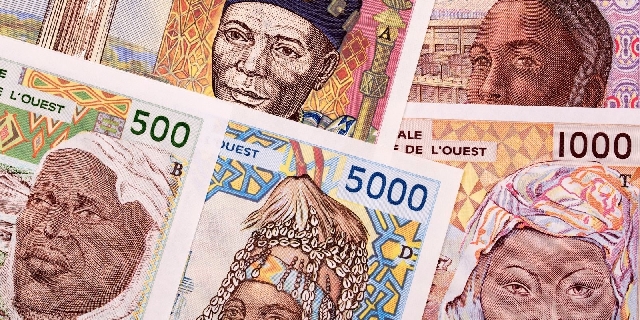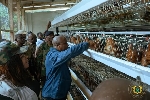Where is that ONE currency for ECOWAS?
 The 15 heads of state and governments of ECOWAS agreed to launch a new currency, the "Eco", in January 2020
The 15 heads of state and governments of ECOWAS agreed to launch a new currency, the "Eco", in January 2020
It has been over a decade since the idea of having a common currency for the countries in the Economic Community of West African States (ECOWAS) was first proposed. The idea was that such a currency would have the following advantages: the benefits of economies of scale, free movement of goods & services, check of inflation, etc.
A recent research paper has taken a deep dive into this topic, evaluating the pros and cons of implementing a single currency in the ECOWAS region. The paper concludes that, while there are some benefits to having a single currency, the disadvantages seem to outweigh them.
In particular, the paper points out that the countries in the region are at very different stages of economic development, making it challenging to implement a single currency successfully.
It is worth noting that, even if the countries in the ECOWAS region did decide to go ahead with a single currency, it would not be easy to implement. The paper estimates that it would take at least 10 years of preparation before such a currency could be introduced. Even then, there is no guarantee of success. Given all of these challenges, it seems unlikely that the countries in the region will be able to agree on and implement a single currency anytime soon. (Eregha, 2012)
Bummer.
The main objective of the Economic Community of West African States (ECOWAS) is to promote economic integration in the region. One of the critical elements of this integration is establishing a single currency, known as the Eco. The Eco was first proposed in 2000 but has yet to be implemented.
There are many reasons for this delay, including the global financial crisis, which hit the region hard; political instability in some member states; and resistance from Nigeria, the region's largest economy.
There is no doubt that a single currency would have many benefits for the region. It would promote trade and investment and make travelling easier for people within the region. It would also help to reduce inflation and stabilize prices. However, there are also some risks associated with Eco.
One of these is the fact that it would be controlled by a central bank, which would be located in Nigeria. This could lead to political interference in monetary policy and make it difficult for other member states to pursue independent economic policies.
Another concern is that the Eco might not be strong enough to compete with other major currencies, such as the U.S. dollar or the Euro. This could lead to inflationary pressures and make it difficult for the Eco to be used internationally.
Overall, both risks and benefits are associated with introducing the Eco. The decision on whether or not to go ahead with this project will ultimately be up to the member states of ECOWAS. However, it is essential to consider all of the implications before making a final decision.
The 15 heads of state and governments of the Economic Community of West African States (ECOWAS) agreed to launch a new currency, the "Eco", in January 2020.
In doing so, ostensibly, the leaders believe that business people and travellers will be freed from the hassles of exchanging currencies, intra-area trade will boom, and an integrated and prosperous region will flourish.
However, there are significant risks associated with this project that could offset any potential benefits. For one, the Eco will be pegged to the Euro, which means it will inherit all of the euro's volatility. (Zhambikov, 2020)
This could create significant problems for countries with weak economic fundamentals, as they will be unable to use monetary policy to stabilize their economies.
Did I already mention that the Eco might be printed in France? I have to crosscheck this later. I’m about 30mins to my submission deadline.
Moving on…
Ultimately, the Eco's success depends on West African leaders' willingness to implement sound economic policies. If they are unwilling or unable to do so, the currency will likely fail if implemented. (Talabi, 2021)
Is West Africa ready for a single currency?
The 15-member Economic Community of West African States (ECOWAS) has been pursuing a common currency agenda centred on the "Eco," intending to reduce barriers to doing business across the region and increasing trade overall.
However, many experts, as I’ve previously mentioned, are sceptical about the feasibility of such a project, given the region's vast economic disparities and lack of fiscal and monetary union. They argue that a single currency would not only be challenging to implement but could also negatively affect the region's economies. (Talabi, 2020)
Supporters of the project counter that while there are challenges, a single currency would ultimately benefit West Africa by boosting trade and economic integration. They point to the success of other regional currency arrangements, such as the Eurozone, as evidence that the Eco can be successful.
At present, it remains unclear whether the Eco will become a reality. However, the debate over its feasibility indicates the challenges and opportunities West Africa faces in its pursuit of economic integration.
Prospective effects on trade
The launch of the Eco currency by the Economic Community of West African States (ECOWAS) could have several different effects on trade within the region.
On the one hand, the currency could make it easier for businesses to operate across borders, as they would no longer need to deal with different exchange rates. This could lead to an increase in trade, as businesses take advantage of the new opportunities created by the Eco.
On the other hand, it is worth iterating that there is a risk that the currency could create economic problems for countries with weak economic fundamentals. This is because the Eco will be pegged to the Euro, which means it will inherit all of the Euro's volatility. This could make it difficult for these countries to stabilize their economies through trade. (Nwali et al., 2022)
The Eco's success will ultimately depend on West African leaders' willingness to implement sound economic policies. If they are unwilling or unable to do so, the currency will likely fail.
Conclusion
The proposed Eco currency by the ECOWAS has the potential to reduce trade barriers and promote economic integration in West Africa. However, there are significant risks associated with the project that could offset any potential benefits. These include the volatility of the Euro, which the Eco will be pegged to, and the real risk of counterfeiting. The Eco's success ultimately depends on West African leaders' willingness to implement sound economic policies. If they are unwilling or unable to do so, the currency will likely fail.
I hope you enjoyed the read. Hit me up and let’s keep the conversation going! I read all the feedback you send. Also, feel free to throw at me topics you’d like to read or hear my thoughts on. You can always head to my Calendly at calendly.com/maxwellampong or connect with me your own way through my Linktree: https://linktr.ee/themax.
Have a blessed week!
♕ ---- ♕ ---- ♕ ---- ♕ ---- ♕ ---- ♕ ---- ♕ ---- ♕ ---- ♕
References
Eregha, P. (2012). The Dynamic Linkages between Foreign Direct Investment and Domestic Investment in ECOWAS Countries: A Panel Cointegration Analysis. African Development Review, 24(3), 208-220. https://doi.org/10.1111/j.1467-8268.2012.00317.x
Talabi, A. (2020). ECO: The Single Currency Agenda in West Africa the Single Currency Agenda in West Africa. SSRN Electronic Journal. https://doi.org/10.2139/ssrn.3638612
Zhambikov, A. (2020). ECOWAS and introduction of single currency in West Africa: problems and prospects. Asia And Africa Today, (3), 54. https://doi.org/10.31857/s032150750008721-5
Talabi, A. (2021). Eco: The Single Currency Agenda in West Africa. International Journal Of African Studies, 1(3), 62. https://doi.org/10.51483/ijafrs.1.3.2021.62-66
Nwali, C., Adegboyega Eyitayo, O., Taiwo Ejiola, M., & Adekemi Adebisola, O. (2022). Effects of Economic Partnership Agreements Between Ecowas and the EU on Trade, Revenue and Welfare of Agricultural Trade of Ecowas Bloc. Turkish Journal Of Agriculture - Food Science And Technology, 10(4), 642-656. https://doi.org/10.24925/turjaf.v10i4.642-656.4720
♕ ---- ♕ ---- ♕ ---- ♕ ---- ♕ ---- ♕ ---- ♕ ---- ♕ ---- ♕
Source: Classfmonline.com/Maxwell Ampong
Trending Features

Stop letting Maths and Science decide Ghana’s future
13:56
President Mahama’s agro-industrial revolution: Turning Ghanaian farms into business powerhouses
12:19
Laud Nartey: Growing unethical behaviour among bank staff- why BoG, GAB must scale up surveillance
07:02
Trapped in a cycle of danger: blood in the recycling factory
12:23
A new Africanism is rising: Why identity matters now
09:26
Kumasi High Court gripped by battle over Daddy Lumba’s widowhood rites
09:13
Drop in WASSCE 2025 performance – Reality check and opportunity for correction?
09:45




